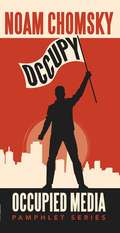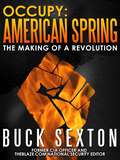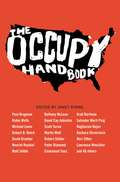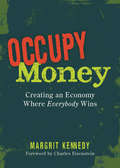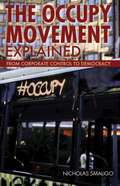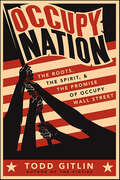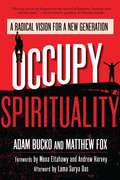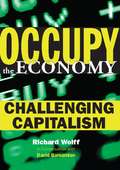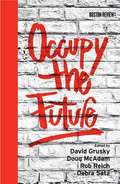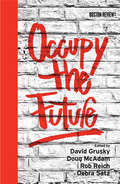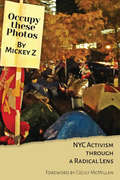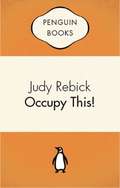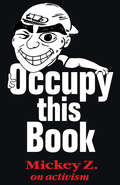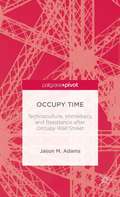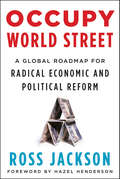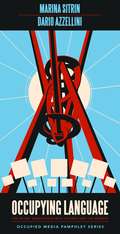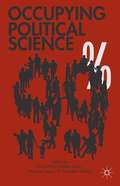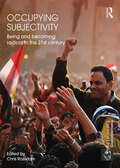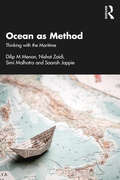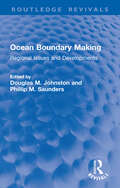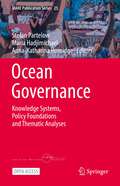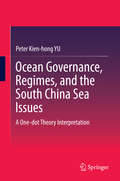- Table View
- List View
Occupy
by Greg Ruggiero Stanley Rogouski Alex Fradkin Noam Chomsky R. BlackWith urgency and clarity, Noam Chomsky speaks with the movement as it transitions from occupying tent camps to occupying the national conscience
Occupy: The Making Of A Revolution
by Buck SextonGlenn Beck TV and Blaze correspondent Buck Sexton goes behind the scenes at Occupy Wall Street and explores the radical roots and revolutionary goals that lie beneath the not-so-ragtag movement.Occupy Wall Street (OWS) became the biggest news story in the world during the fall of 2011. Under the banner of the "99%", the Occupiers spread their message of class warfare and revolution across the globe. Using cutting-edge digital media propaganda combined with the street protest strategies honed by 1960s radicals, OWS has already changed our political system. Now they seek to change our future. The American Spring has arrived. The Occupiers plan to dominate news headlines by using direct action protests across the country during this pivotal presidential election year. They intend to take to the streets in every major U.S. city. The stakes could not be higher. Buck Sexton, a former CIA counterterrorism and counterinsurgency analyst, has covered the Occupiers from the start. He’s infiltrated their marches and "general assemblies" at every major OWS event to uncover the truth about this neo-Marxist movement. With a focus on history, ideology and tactics, Sexton breaks down OWS—and its plans for reshaping America.
The Occupy Handbook
by Janet ByrneAnalyzing the movement's deep-seated origins in questions that the country has sought too long to ignore, some of the greatest economic minds and most incisive cultural commentators - from Paul Krugman, Robin Wells, Michael Lewis, Robert Reich, Amy Goodman, Barbara Ehrenreich, Gillian Tett, Scott Turow, Bethany McLean, Brandon Adams, and Tyler Cowen to prominent labor leaders and young, cutting-edge economists and financial writers whose work is not yet widely known - capture the Occupy Wall Street phenomenon in all its ragged glory, giving readers an on-the-scene feel for the movement as it unfolds while exploring the heady growth of the protests, considering the lasting changes wrought, and recommending reform. A guide to the occupation, THE OCCUPY HANDBOOK is a talked-about source for understanding why 1% of the people in America take almost a quarter of the nation's income and the long-term effects of a protest movement that even the objects of its attack can find little fault with.
Occupy Money
by Margrit KennedyAs a medium of exchange, money is one of the most ingenious inventions of mankind, as it facilitates the trade of goods and services and allows for specialization and the division of labor. However, compound interest and inflation have caused our monetary system to balloon to the point where bailing out banks, large corporations, and even entire countries will not prevent a complete breakdown of the global economy - unless we change the system in fundamental ways.It's time for a grassroots movement to knock conventional money off its pedestal and replace it with a fresh paradigm that puts people before profits. A guide not only for the 99% but also for the 1%, Occupy Money demonstrates that the creation of a stable and sustainable monetary system will reflect real wealth, rather than the smoke and mirrors of speculative profit, thus providing an alternative to the Age of Austerity. This vision can be realized through such creative initiatives as: Establishing time banks and complementary currencies geared to specific services such as health and education Eliminating interest through interest-free loans and "demurrage", which rewards currency circulation Re-localizing economies through regional currencies.For many years financial insiders have hidden economic truths by describing them in arcane terms that no layperson can understand. Occupy Money uses clear, simple and concise language to explain how money will serve people instead of people serving money, and in doing so it issues a challenge to the very foundations of conventional economic doctrine. A must-read.Margrit Kennedy is the author of the international bestseller Interest and Inflation-Free Money, an outspoken critic of the current global economic system and a renowned advocate of alternative regional and complementary currencies.
The Occupy Movement Explained
by Nicholas SmaligoThe Occupy Movement Explained is a readable, compact account and analysis of the Occupy protests, by a scholar who participated in several Occupy events. The book is thoroughly researched, painstakingly accurate, and fully documented.<P><P> It debunks a number of myths and misunderstandings that have become rife. Nicholas Smaligo shows how the movement arose out of radical currents that have been active below the media's radar since the 1970s. Occupiers are not all the same, and the author reviews some of the debates and changes within the movement.The occupations began under a slogan that conjured up a naive sense of unity--"We Are the 99%!" It did not take very long for that sense of unity to give way to an appreciation of just how socially, economically, and ideologically fragmented American society is. For some, this was an excuse to return to their cynicism--for others, it was an invitation to lose their illusions and begin to see the world from the viewpoint of political activists. The Occupy Movement Explained describes this process of education and the lessons learned about "the 99%", the police, direct democracy, political demands, and the intimately related questions of social change, violence and property.
Occupy Nation: The Roots, the Spirit, and the Promise of Occupy Wall Street
by Todd Gitlin“[A] much needed book…a compelling portrait of the Occupy movement…that capture[s] the spirit of the people involved, the crisis that gave Occupy birth, and the possibility of genuine change it represents.”—Eric Foner, author of The Fiery Trial: Abraham Lincoln and American SlaveryThe Occupy Wall Street movement arose out of a widespread desire of ordinary Americans to change a political system in which the moneyed “1%” of the nation controls the workings of the government. In Occupy Nation, social historian Todd Gitlin—a former leader of the Students for a Democratic Society (SDS) who stood at the forefront of the birth of the New Left and the student protests of the 1960s and ’70s—offers a unique overview of one of the most rapidly growing yet misunderstood social revolutions in modern history. Occupy Nation is a concise and incisive look at the Occupy movement at its pivotal moment, as it weighs its unexpected power and grapples with its future mission.
Occupy Spirituality: A Radical Vision for a New Generation (Sacred Activism #1)
by Matthew Fox Andrew Harvey Lama Surya Das Adam Bucko Mona EltahawyThe Occupy Wall Street movement and protest movements around the world are evidence of a new era of intergenerational activists seeking deeper spiritual meaning in their quest for peace and justice.This book is a call to action for a new era of spirituality-infused activism. Authors Adam Bucko and Matthew Fox encourage us to use our talents in service of compassion and justice and to move beyond our broken systems--economic, political, educational, and religious--discovering a spirituality that not only helps us to get along, but also encourages us to reevaluate our traditions, transforming them and in the process building a more sacred and just world.Incorporating the words of young activist leaders culled from interviews and surveys, the book provides a framework that is deliberately interfaith and speaks to our profound yearning for a life with spiritual purpose and for a better world. Each chapter is construed as a dialogue between Fox, a 72-year-old theologian, and Bucko, a 37-year-old spiritual activist and mentor to homeless youth. As we listen in on these familiar yet profound conversations, we learn about Fox and Bucko's own spiritual journeys and discover a radical spirituality that is inclusive, democratic, and relevant to the world we live in today.Table of ContentsForeword by Mona EltahawyForeword by Andrew HarveyIntroduction: Invitation to Occupy Your Conscience1. Is It Time to Replace the God of Religion with the God of Life?2. Radical Spirituality for a Radical Generation3. Adam's Story4. Matthew's Story5. What's Your Calling? Are You Living in Service of Compassion and Justice?6. Spiritual Practice: Touch Life and Be Changed by It 7. No Generation Has All the Answers: Elders and Youth Working Together8. Birthing New Economics, New Communities, and New Monasticism Conclusion: Occupy Generation and the Practice of Spiritual Democracy Afterword by Lama Surya DasFrom the Trade Paperback edition.
Occupy the Economy
by David Barsamian Richard D. WolffToday's economic crisis is capitalism's worst since the Great Depression. Millions have lost jobs, homes, and healthcare. Many with jobs watch pensions, benefits, and job security decline. While most live with increasing uncertainty, the system makes the very wealthy even richer. In eye-opening interviews with prominent economist Richard Wolff, David Barsamian probes the root causes of the current crisis, its unjust social costs, and what can and should be done to turn things around. While others blame corrupt bankers and unregulated speculators or the government or even the poor who borrowed, the authors show that the causes of the crisis run much deeper. They reach back to the 1970s when the capitalist system itself shifted, ending the century-old pattern of rising wages for Americans and thereby enabling the top 1% to become ultra-rich at the expense of the 99%. Since then, economic injustice has become chronic and further corrupted politics. Occupy's indignation with the whole system mobilizes a diverse range of Americans who seek basic change. Occupying the Economy not only clarifies and analyzes the crisis in US capitalism today, it also points toward solutions that can shape a far better future for all.Richard Wolff is professor of economics at U. Mass, and visiting professor at the New School in New York City. He hosts a program on WBAI and is author of the hit book Capitalism Hits the Fan.David Barsamian is director of Alternative Radio and author of many interview books, including What We Say Goes with Noam Chomsky.
Occupy the Future
by David Grusky Doug Mcadam Rob Reich Debra SatzThe Occupy Wall Street movement has ignited new questions about the relationship between democracy and equality in the United States. Are we also entering a moment in history in which the disjuncture between our principles and our institutions is cast into especially sharp relief? Do new developments--most notably the rise of extreme inequality--offer new threats to the realization of our most cherished principles? Can we build an open, democratic, and successful movement to realize our ideals? Occupy the Future offers informed and opinionated essays that address these questions. The writers--including Nobel Laureate in Economics Kenneth Arrow and bestselling authors Paul and Anne Ehrlich--lay out what our country's principles are, whether we're living up to them, and what can be done to bring our institutions into better alignment with them.
Occupy the Future (Boston Review Books)
by David Grusky Rob Reich Debra Satz Doug McAdamHow the Occupy movement has challenged the gap between American principles and American practice—and how we can realize our most cherished ideals.The Occupy Wall Street movement has ignited new questions about the relationship between democracy and equality in the United States. Are we also entering a moment in history in which the disjuncture between our principles and our institutions is cast into especially sharp relief? Do new developments—most notably the rise of extreme inequality—offer new threats to the realization of our most cherished principles? Can we build an open, democratic, and successful movement to realize our ideals? Occupy the Future offers informed and opinionated essays that address these questions. The writers—including Nobel Laureate in Economics Kenneth Arrow and bestselling authors Paul and Anne Ehrlich—lay out what our country's principles are, whether we're living up to them, and what can be done to bring our institutions into better alignment with them.Contributers: David Grusky, Doug McAdam, Rob Reich, Erin Cumberworth, Debra Satz, Kenneth J. Arrow, Kim A. Weeden, Sean F. Reardon, Prudence L. Carter, Shelley J. Correll, Gary Segura, David D. Laitin, Cristobal Young, Charles Varner, Doug McAdam, Paul R. Ehrlich, Anne H. Ehrlich, Paul R. Ehrlich and Anne H. Ehrlich, Donald A. Barr, Michele Elam, Jennifer DeVere Brody, H. Samy Alim and David Palumbo-Liu.
Occupy These Photos: NYC Activism Through a Radical Lens
by Cecily Mcmillan Mickey Z.Mickey Z. continues his advocacy work by taking his camera to the streets and showing a number of major demonstrations and protests that occurred in NYC between #OWS and #BlackLivesMatter as he saw them. Not a professional photographer but a street photographer capturing those who, like him, turn out daily to protest and demand changes to an unfair and unequal system as it affects all life in NYC, human and non-human.
Occupy This
by Judy RebickFeminist and social activist Judy Rebick brings decades of experience to her account of the Occupy movement in cities across North America. Linking Occupy to social movements of the past and exploring the courage and creativity of a new generation, Rebick argues that the Occupy movement and its counterparts around the globe represent a rise of people power at least as important as the 1960s. Inspired by the Arab Spring, informed by the Indignados (the "Indignant Ones" who protested austerity cuts in Europe and Latin America) and responding to a call from the Canadian magazine Adbusters to occupy Wall Street, a group of young people set up a camp near the Stock Exchange in New York City on September 17, 2011. They called out to the 99 percent to occupy Wall Street, which they saw as the root of much of the injustice and inequality in the world. Marvelling at how quickly the Occupiers gained support and impressed by their organizing ability and commitment to non-hierarchical democratic processes, Rebick says the encampments provide the sense of community that neo-liberal capitalism-- with its emphasis on the individual instead of the collective good -- has destroyed. Occupiers aren't so much rebelling, she maintains, as creating an alternative to the dominant cultural, economic, and social systems - in other words, a cultural revolution. Filled with eye-opening anecdotes and thoughtful interviews with activists around the globe, Occupy This! is an inspiring look at a new wave of change.
Occupy This
by Judy RebickFeminist and social activist Judy Rebick brings decades of experience to her account of the Occupy movement in cities across North America. Linking Occupy to social movements of the past and exploring the courage and creativity of a new generation, Rebick argues that the Occupy movement and its counterparts around the globe represent a rise of people power at least as important as the 1960s. Inspired by the Arab Spring, informed by the Indignados (the "Indignant Ones" who protested austerity cuts in Europe and Latin America) and responding to a call from the Canadian magazine Adbusters to occupy Wall Street, a group of young people set up a camp near the Stock Exchange in New York City on September 17, 2011. They called out to the 99 percent to occupy Wall Street, which they saw as the root of much of the injustice and inequality in the world. Marvelling at how quickly the Occupiers gained support and impressed by their organizing ability and commitment to non-hierarchical democratic processes, Rebick says the encampments provide the sense of community that neo-liberal capitalism-- with its emphasis on the individual instead of the collective good -- has destroyed. Occupiers aren't so much rebelling, she maintains, as creating an alternative to the dominant cultural, economic, and social systems - in other words, a cultural revolution. Filled with eye-opening anecdotes and thoughtful interviews with activists around the globe, Occupy This! is an inspiring look at a new wave of change.
Occupy This Book: Mickey Z. on Activism
by Richard Cole Mickey Z.The all-purpose guide to dedicating your life to changing the world by one of the most visible leaders of the Occupy Wall Street movement. Mickey Z. has been an activist and philosopher of activism since 2000 and in this book shares a wealth of experience in a simple and straightforward voice aided and abetted by the wonderful cartoons of Richard Cole.
Occupy Time
by Jason M. AdamsWhile secondary texts on Paul Virilio typically see no way out of the tempo- and techno-dystopia he articulates, Occupy Time engages the events of Occupy Wall Street to fix attention on what such readings circumvent: Virilio's elusive theory of resistance.
Occupy World Street
by Ross JacksonAcross the world, in an ever-growing number of cities, people are starting to rise up against a global financial cabal that has, essentially, bought governments and left economies in tatters. Debt-stricken European countries are witnessing demonstrations from angry citizens as their economies crumble and pundits discuss how long it will take for neighbouring nations to follow suit. These protestors may not clearly understand the roots of the economic problems, nor be able to articulate solutions. But they know one thing: their lives have been radically changed, for the worse, by an unsustainable financial paradigm. In Occupy World Street, Ross Jackson delivers one of the most incisive, clear descriptions of the global financial practices that have driven economies to the brink of collapse. He also puts forth a compelling, detailed plan to let sovereign nations regain control of their economies, reorganise global trade alliances on a more human scale, and gradually phase out global institutions that have wreaked havoc, replacing them with institutions that support sustainable economies, uphold human rights and respect environmental standards. In essence, Jackson has done what few others have dared to do: constructed a specific, implementable plan to reorganise the way world economies work. It's a plan that, according to sustainable economics pioneer Hazel Henderson, "has the potential to unite hundreds of NGOs and millions of ordinary citizens in the streets behind a single simple proposal that could change the current dysfunctional game. "
Occupying Iraq: A History of the Coalition Provisional Authority
by Seth G. Jones Benjamin Runkle Siddharth Mohandas James DobbinsFocuses on the activities of the Coalition Provisional Authority during the first year of the occupation of Iraq. Based on interviews and nearly 100,000 never-before-released documents from CPA archives, the book recounts and evaluates the efforts of the United States and its coalition partners to restore public services, counter a burgeoning insurgency, and create the basis for representative government.
Occupying Language
by Dario Azzellini Marina SitrinWhile the global Occupy movement is widely seen as unprecedented, its language and organizing practices are shaped and inspired by diverse historical precedents in the United States and around the world. Marina Sitrin and Dario Azzellini introduce the reader to the theory and practices of the movement and explore linkages and connections toward the dream of a common language of struggle, justice, democracy, and liberation. Marina Sitrin is an author and activist. An early organizer of the Occupy movement, she has been interviewed in Rolling Stone, The New York Times, Democracy Now! and more. Dario Azzellini is an activist, writer, and filmmaker. He is a lecturer at the Johannes Kepler University (Linz, Austria) and holds PhDs in political science and sociology. His latest book, together with Immanuel Ness, is Ours to Master and to Own.
Occupying Political Science
by Emily Welty Matthew Bolton Meghana Nayak Christopher MaloneOccupying Political Science is a collection of critical essays by New York based scholars, researchers, and activists, which takes an unconventional look at the Occupy Wall Street movement through concepts found in the field of political science. Both normative and descriptive in its approach, Occupying Political Science seeks to understand not only the origins, logic, and prospects of the OWS movement, but also its effect on political institutions, activism, and the very way we analyze power. It does so by asking questions such as: How does OWS make us rethink the discipline of political science, and how might the political science discipline offer ways to understand and illuminate aspects of OWS? How does social location influence OWS, our efforts to understand it, and the social science that we do? Through addressing topics including social movements and non-violent resistance, surveillance and means of social control, electoral arrangements, new social media and technology, and global connections, the authors offer a unique approach that takes seriously the implications of their physical, social and disciplinary location, in New York, both in relation to Occupy Wall Street, and in their role as scholars in political science.
Occupying Subjectivity: Being and Becoming Radical in the 21st Century
by Chris RossdaleThis book explores a variety of forms of radical political subjectivity. It takes its cue from the 2011 uprisings in the Middle East and North Africa, the Occupy Movement and the European Anti-Austerity Movement, alongside the wider opposition to authoritarian and neoliberal forms of governance from which they sprang, in order to ask an urgent series of questions about the subject of radical politics: Who or what is it that engages in resistance? Who or what should they be? And how are we to negotiate the many complexities of that second question? The contributions, drawing on a wide range of theoretical traditions, offer a rich series of provocations towards new ways of conceptualising, evaluating and imagining radical political praxis. They engage different kinds of subjects, including protestors, dancers, self-burners, academics, settlers and humans, in order to think through the ways in which contemporary subjects are constituted within and work to unsettle dominant relations of power. Together, the chapters open up spaces to think about how political and intellectual commitment to social change can be enlivened through attention to the subject of radical politics. This book was published as a special issue of Globalizations.
Occupying Syria under the French Mandate
by Daniel NeepWhat role does military force play during a colonial occupation? The answer seems obvious: coercion crushes local resistance, quashes political dissent, and consolidates the dominance of the occupying power. However, as this discerning and theoretically rigorous study suggests, violence can have much more ambiguous consequences. Set in Syria during the French Mandate from 1920 to 1946, the book explores a turbulent period in which conflict between armed Syrian insurgents and French military forces not only determined the strategic objectives of the colonial state, but also transformed how the colonial state organised, controlled, and understood Syrian society, geography, and population. In addition to the coercive techniques of airpower, collective punishment, and colonial policing, the book shows how civilian technologies such as urban planning and engineering were also commandeered in the effort to undermine rebel advances. In this way, colonial violence had a lasting effect in Syria, shaping a peculiar form of social order that endured well after the French occupation. As the conclusion surmises, the interplay between violence, spatial colonisation, and pacification continues to resonate with recent developments in the region.
Ocean as Method: Thinking with the Maritime
by Dilip M Menon Nishat Zaidi Simi Malhotra Saarah JappieOcean as Method presents a new way of thinking about the humanities and the social sciences. It explores maritime connections in social and humanistic research and puts forward an alternative to national histories and area studies. As global warming and rising sea levels ring alarm bells across the world, the chapters in the volume argue that it is time to think through oceans to realign discourses which better understand our future. The volume: • Engages with the paradigms of oceanic narratives to identify connections between continents through trade, migration, and economic processes, thinking beyond the artificial distinctions between the Pacific, Atlantic, and Indian Oceans; • Discusses oceanic travel accounts by Muslim travellers to counter the idea that the colonial era was marked by European travel to Asia and Africa, without a counterflow of “native travel”; •Examines the connections between South Africa, South Asia, and South East Asia through histories of Indian indenture and the slave trade, and engages with the idea of the ocean and enforced movement; •Compares and connects recent scholarship in the social sciences and the humanities centring the ocean to break away from inherited paradigms which have shaped world history so far. As a unique transdisciplinary collaboration, this volume will be of much interest to scholars and researchers of history, especially oceanic history, historiography, critical theory, literature, geography, and Global South studies.
Ocean Boundary Making: Regional Issues and Developments (Routledge Revivals)
by Douglas M. Johnston Phillip M. SaundersOriginally published in 1988, this book was written at a time when many nations were engaged in various forms of ocean boundary making. This created new regional pressures and the need for collective regional responses to these issues. This book examines the issues at stake and the boundary making processes. It discusses these in a general way, showing how the Third UN conference on the Law of the Sea helped resolve the problems whilst leaving some issues unresolved. The book goes onto examine the issues and boundary making processes in 7 important areas of the world
Ocean Governance: Knowledge Systems, Policy Foundations and Thematic Analyses (MARE Publication Series #25)
by Anna-Katharina Hornidge Maria Hadjimichael Stefan PartelowThis Open Access book on Ocean Governance examines sustainability challenges facing our oceans today. The book is organized into three sections: knowledge systems, policy foundations and thematic analyses. The knowledge produced in the book was catalyzed by the scientific outcomes within the European-funded Cooperation in Science and Technology (COST) network “Ocean Governance for Sustainability – Challenges, Options and the Role of Science”. This network brings together scientists, policy-makers and civil society representatives from 28 nation states to cooperate on ocean governance research. This book offers a compilation of new research material including focused case studies, broad policy syntheses and reflective chapters on the history and current status of knowledge production systems on ocean governance. New research material is presented, although some chapters draw on secondary sources. The book starts with synthetic review chapters from the editors, outlining past and present knowledge systems, addressing how and why ocean governance for sustainability is where it currently stands with critical reflections on existing narratives, path dependencies and colonialist histories. This is followed by chapters addressing, synthesizing and analyzing different legal and policy frameworks for ocean governance both regionally and internationally. At the core of the book are the thematic analyses, which provide focused case studies with detailed contextual information in support of different ocean governance challenges and sustainability pathways around the world. The book concludes with a chapter explicitly targeting students, researchers and policy-makers with key take-away messages compiled by the editors.
Ocean Governance, Regimes, and the South China Sea Issues
by Peter Kien-hong YuThis book uses Chinese version of dialectics to present interpretations of ocean governance, international regimes, issues in the South China Sea in general and the Chinese U-shaped line in particular, through the one-dot theory. It especially serves as a tool for non-Chinese researchers and experts interested in analyzing international relations issues from a Chinese perspective. The dialectical one-dot theory, which is a superior model to the dialectical Yin and Yang or the dialectical crab and frog motion model, provides research and findings that more closely mirror reality than do other, non-dialectical approaches and research methods. Further, it can be applied to both the natural and social sciences. The book is divided into three parts -- Methodology, Case Studies Related to International Regimes and Non-"International Regimes," and Issues Related to the U-shaped Line in the South China Sea -- with each chapter structured in terms of the one-dot theory. In addition to researchers and experts involved in marine and maritime affairs, this book will also appeal to all readers interested in Chinese Philosophy, International Relations, and Strategic Culture.
